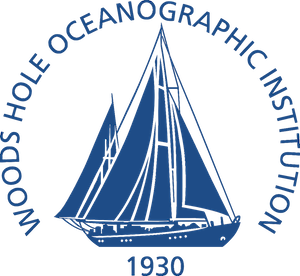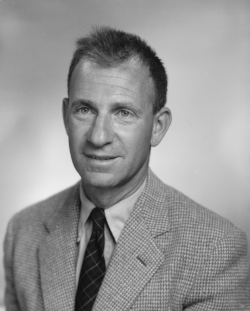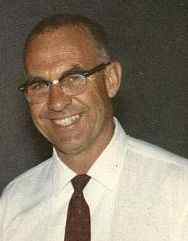
The Woods Hole Oceanographic Institution is a private, nonprofit research and higher education facility dedicated to the study of marine science and engineering.
The Alexander Agassiz Medal is awarded every three years by the U.S. National Academy of Sciences for an original contribution in the science of oceanography. It was established in 1911 by Sir John Murray in honor of his friend, the scientist Alexander Agassiz.

Walter Heinrich Munk was an American physical oceanographer. One of the first scientists to bring statistical methods to the analysis of oceanographic data, Munk is noted for creating fruitful areas of research that continue to be explored by other scientists. Munk's work garnered him many prestigious awards including the National Medal of Science, the Kyoto Prize, and induction to the French Legion of Honour.
Sallie Watson "Penny" Chisholm is an American biological oceanographer at the Massachusetts Institute of Technology. She is an expert in the ecology and evolution of ocean microbes. Her research focuses particularly on the most abundant marine phytoplankton, Prochlorococcus, that she discovered in the 1980s with Rob Olson and other collaborators. She has a TED talk about their discovery and importance called "The tiny creature that secretly powers the planet".

Sir Peter Leonard Knight is a British physicist, professor of quantum optics and senior research investigator at Imperial College London, and principal of the Kavli Royal Society International Centre. He is a leading academic in the field of quantum optics and is the recipient of several major awards including the Royal Medal from the Royal Society and the Thomas Young Medal and Prize from the Institute of Physics. He is a former president of the Institute of Physics and the Optical Society of America, the first non North American-based person to take the position.
Sverdrup Gold Medal Award – is the American Meteorological Society's award granted to researchers who make outstanding contributions to the scientific knowledge of interactions between the oceans and the atmosphere.
Lynne Talley is a physical oceanographer at Scripps Institution of Oceanography known for her research into the large-scale circulation of water masses in the global ocean.
The IEEE Photonics Society, formerly the IEEE Lasers and Electro-Optics Society (LEOS), is a society of the Institute of Electrical and Electronics Engineers (IEEE), focused on the scientific and engineering knowledge about the field of quantum electronics. In the hierarchy of IEEE, the Photonics Society is one of the close to 40 technical societies organized under the IEEE Technical Activities Board.
Klaus Wyrtki was an American physical oceanographer.
Adrian Edmund Gill FRS was an Australian meteorologist and oceanographer best known for his textbook Atmosphere-Ocean Dynamics. Gill was born in Melbourne Australia and worked at Cambridge, serving as Senior Research Fellow from 1963 to 1984. His father was Edmund Gill, geologist, palaeontologist and curator at the National Museum of Victoria.

Frank Edwin Snodgrass (1920-1985) was a physical oceanographer and electrical engineer. He spent nearly all of his career working with Prof. Walter Munk at Scripps Institution of Oceanography (SIO). The Cecil H. and Ida M. Green branch of the University of California Systemwide Institute of Geophysics and Planetary Physics (IGPP), in La Jolla, California has been strongly linked to Scripps since the 1960s through joint faculty appointments, research interests, and shared facilities. Other IGPP branches can be found at the Los Angeles, Irvine, Santa Cruz and Riverside campuses. Snodgrass spent many years researching and measuring the ocean tides and waves. During his career he had opportunities to work with fellow scientists around the world, including collaborations through the IGPP campuses, with Woods Hole Oceanographic Institution in Massachusetts and with the National Institute of Oceanography in England.
Johann Reinder Erlers Lutjeharms, was a leading South African marine scientist and an authority in the oceanography of the Agulhas Current, who authored a definitive work on the subject, The Agulhas Current. His main field of investigation was the large-scale circulation patterns of the oceans adjacent to southern Africa and their influence on weather and climate, and he participated in 17 research cruises and was responsible for a further 48 projects undertaken on such cruises.
The A.G. Huntsman Award for Excellence in the Marine Sciences was established in 1980 by the Canadian marine science community to recognize excellence of research and outstanding contributions to marine sciences. It is presented by the Royal Society of Canada. The award honours marine scientists of any nationality who have had and continue to have a significant influence on the course of marine scientific thought. It is named in honour of Archibald Gowanlock Huntsman (1883–1973), a pioneer Canadian oceanographer and fishery biologist

Karen Joy Heywood is a British Antarctic oceanographer and Professor of Physical Oceanography at the University of East Anglia (UEA). She is best known for her work developing autonomous measurements of the Southern Ocean.
Ellen Druffel is an American oceanographer and isotope geochemist known for her research using radiocarbon to track marine processes.

Trevor John McDougallFAGU is a physical oceanographer specialising in ocean mixing and the thermodynamics of seawater. He is Scientia Professor of Ocean Physics in the School of Mathematics and Statistics at the University of New South Wales, Sydney, Australia. He is President of the International Association for the Physical Sciences of the Oceans (IAPSO) of the International Union of Geodesy and Geophysics.
Rana Arnold Fine is Professor Emeritus from the University of Miami's Rosenstiel School of Marine and Atmospheric Science. Her research primarily addresses understanding ocean circulation processes over time through the use of chemical tracers and the connection to climate.
David Michael Karl is an American microbial biologist and oceanographer. He is the Victor and Peggy Brandstrom Pavel Professor of Microbial Oceanography at the University of Hawaiʻi at Mānoa and the Director of the University Center for Microbial Oceanography: Research and Education.
Mary Jane Perry is an American oceanographer known for the use of optics to study marine phytoplankton.





